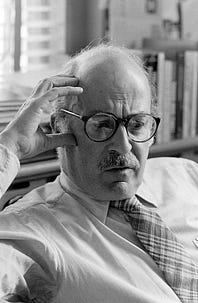|
 |
The Writer's Almanac for Tuesday, September 19, 2023
An excerpt from “Spring Glen Grammar School” by Donald Hall from Selected Poems: 1946-2006. © Houghton Mifflin, 2006.
On this day in 1900, Butch Cassidy and the Sundance Kid committed their first robbery together, taking $32,640 from the First National Bank of Winnemucca, Nevada. They were a part of the "Wild Bunch Gang," a group of ruffians and robbers who committed the longest string of successful bank robberies in American history. Most of the Winnemucca loot was in gold coin. Witnesses said the robbers wore masks. It was a midday robbery and quite daring, though the escape left something to be desired: as the robbers fled, they dropped a sack of gold by a creek and had to go back and retrieve it. They had fresh horses waiting, though, and soon were on their way. The citizens of Winnemucca organized a posse and even used a yard locomotive to pursue the robbers.
The money was never recovered and, in fact, no one really knew for sure if Butch Cassidy was even there; some said he was actually in Tipton, Wyoming, planning another robbery during the Winnemucca escapade. The American Bankers Association even brought in the famed Pinkerton Detective Agency, but they never discovered the robbers' identities, either.
Tales of The Wild Bunch and their crime spree kept citizens enthralled. People couldn't get enough of hearing about The Tall Texan, News Carver, Kid Curry, and, of course, Butch and Sundance. The Sundance Kid was born Robert Longabaugh but changed his name after stealing a horse in Sundance, Wyoming, and sitting in jail for a few years. Someone once referred to the Sundance Kid as "a Pennsylvania German with steel blue eyes and a foul temper." Butch Cassidy was born a more palatable "Robert LeRoy Parker," and before he hooked up with The Wild Bunch, he led a gang called "The Hole-In-the-Wall-Gang," because they used to hide out in the Hole-In-the-Wall Pass, a series of caves in Johnson City, Wyoming, where lots of gangs had hideouts.
The Wild Bunch committed robberies across New Mexico, Wyoming, Nevada, and South Dakota. They robbed banks, trains, whatever they felt they could get away with. One of their largest hauls was from a train outside Folsom, New Mexico, when they stole away with more than $70,000.
No one knows for sure what happened to Butch Cassidy and the Sundance Kid. The Pinkertons got closer to apprehending them every day, and one theory is that they hotfooted it to Bolivia, where they were killed by soldiers in 1908. Others claim they returned and settled down to lives of anonymity in small western towns.
One thing is for sure: Winnemucca, Nevada, doesn't seem to hold a grudge against Butch Cassidy or the Sundance Kid. Every September, the town stages "Butch Cassidy Days," a rollicking re-enactment of that long-ago robbery.
Today is the birthday of essayist Roger Angell, born in New York in 1920. His mother was The New Yorker's first fiction editor, and his father was an attorney and leader of the ACLU. (His stepfather was E.B. White, author of Charlotte's Web.)
He's most well known for writing essays about baseball, and he's the only writer who was elected to both the Baseball Hall of Fame and the American Academy of Arts and Letters. In 1975, he wrote in an essay called "Agincourt and After": "It is foolish and childish, on the face of it, to affiliate ourselves with anything so insignificant and patently contrived and commercially exploitative as a professional sports team, and the amused superiority and icy scorn that the non-fan directs at the sports nut […] is understandable and almost unanswerable. Almost. What is left out of this calculation, it seems to me, is the business of caring — caring deeply and passionately, really caring — which is a capacity or an emotion that has almost gone out of our lives. […] It no longer matters so much what the caring is about, how frail or foolish is the object of that concern, as long as the feeling itself can be saved. Naïveté — the infantile and ignoble joy that sends a grown man or woman to dancing and shouting with joy in the middle of the night over the haphazardous flight of a distant ball — seems a small price to pay for such a gift."
Angell roots for the Mets, and doesn't get too discouraged when they lose. He thinks that rooting for a team that wins all the time is overrated, because you take it for granted and there's less drama in watching the game. He said, "Almost winning is almost the best. But you've got to win once in a while."
Angell wrote an essay about getting older in 2014 called "This Old Man," which he included in a book of essays of the same title. He writes about his own experience of changing physically and losing friends, and how society treats elderly people as if they're irrelevant. He describes a conversation where "There's a pause, and I chime in with a couple of sentences. The others look at me politely, then resume the talk exactly at the point where they've just left it. What? Hello? Didn't I just say something? Have I left the room? […] When I mention the phenomenon to anyone around my age, I get back nods and smiles. Yes, we're invisible. Honored, respected, even loved, but not quite worth listening to anymore. You've had your turn, Pops; now it's ours."
His wife, Carol, passed away shortly before he wrote the essay. She had told him, "If you haven't found someone else by a year after I'm gone, I'll come back and haunt you." Angell writes about how we look down on older people when they start dating again, as if we expect them to settle into the background of life and certainly not try anything new that's romantic or sexual. He writes: "But to hell with them and with all that, O.K.? Here's to you, old dears. You got this right, every one of you. Hook, line, and sinker; never mind the why or wherefore; somewhere in the night; love me forever, or at least until next week."
Today is the birthday of Canadian-born American pathologist Elizabeth Stern Shankman, born in Cobalt, Canada (1915). Shankman was one of the first scientists specializing in cytopathology, which is the study of diseased cells. Her research made it possible to detect cervical cancer before it reached an advanced stage, a breakthrough in women's health that enabled early cancer detection and treatment. Before Stern's discoveries, cervical cancer was nearly always fatal.
In 1963, Shankman published the first case report linking a specific virus, in this case, herpes simplex, to a specific cancer, like cervical cancer. Shankman showed that a normal cell advances through 250 distinct stages before reaching an advanced cancerous stage. This allowed the development of diagnostic techniques and excision of abnormal tissue, which reduced the fatality rate drastically.
In 1973, Elizabeth Stern Shankman was the first to identify a direct link between prolonged use of oral contraceptives and cervical cancer. Her research was also deeply concerned with the health care of lower-income women, predominantly black and Hispanic, who typically could not afford proper care and often did not want to be examined by male doctors. She worked with Los Angeles County family planning clinics to pilot studies in which women were offered free transportation, baby-sitting, and trained health care workers to encourage women to attend the clinics for health screenings. Shankman knew that the highest rates of cervical cancer occurred in the poorest areas of Los Angeles.
Elizabeth Stern Shankman died of stomach cancer in 1980. Before she died, she spent months assembling her research, studies, ideas, and statistics so that scientists following in her stead could use her material to save more lives.
Be well, do good work, and keep in touch.®
WRITER’S ALMANAC CAP
LINK
You’re a free subscriber to The Writer's Almanac with Garrison Keillor. Your financial support is used to maintain these newsletters, websites, and archive. Support can be made through our garrisonkeillor.com store, by check to Prairie Home Productions P.O. Box 2090, Minneapolis, MN 55402, or by clicking the SUBSCRIBE button. This financial support is not tax deductible.


